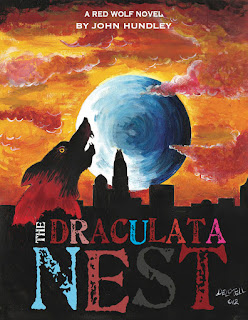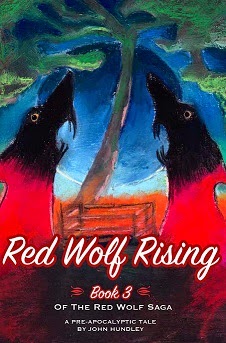History of The Dragon, Part 1
Hi, folks. This week’s post is a little late, so
I’ll apologize to the dozen or so loyal readers of this blog. I’ve had to
literally drag myself online the
lately for the simple fact that I’m so immersed in finishing up Red Wolf Rising. The third novel in the
Red Wolf saga is coming along nicely and I’m excited about how the various
characters and their stories are falling in line.
Since the last several weeks were spent sharing
an excerpt of Claire’s last visit to The Dragon, and since readers have
expressed an interest in the dragons of the Red Wolf universe in general, I
thought I’d share some background of the one who originated the Prophecy of the
Red Wolf.
I meant this to be a character profile. But
dragons are such enigmatic creatures. What follows is more of a history lesson.
I’m not sure how much insight it provides into Pieter’s true character. I gave
it my best shot.
But first…
What I’m Currently
Reading…
…is (still) Douglas
Preston and Lincoln Child’s Brimstone, which I’m about 80% of the way through
at this writing. I’m finding it a bit longish, but that may be due to the way
I’m reading it, in little snatches on my bus rides about town. It probably
deserves more focus.
Next up on my TBR list is Frost Burned, by Patricia Briggs, the seventh book in her Mercy
Thompson series. You might remember this series was number four on my Top FiveParanormal Countdown. I thought the books about this shape-shifting coyote
raised by werewolves went downhill when Mercy finally chose a mate in the fifth
or sixth novel, but I’m going to give her another chance. Both Mercy and Briggs
deserve it.
Okay, let’s see now. About that dragon…
History of The Dragon,
Part 1…
The dragons are among the oldest of the Fae, the general term given to the
eclectic mix of incredibly long-lived creatures of magic who adopted Earth as
their home many millions of years ago. Dragons seem to have appeared sometime
during the Late Cretaceous period, and although there is no written history
among the Fae, legend speculates they may have originally been attracted to a
climate that supported the larger dinosaurs of that time.
The dragon who calls himself Pieter (the Fae
never reveal their true names since it would make them more vulnerable to all
sorts of magic) claims to have been born here on Earth some twenty-nine-plus
million years ago, during a period when the climate was still warm. But he
spent his formative years “growing up” in a period when the planet was plunged
into a series of ice ages, to which he attributes his fondness for colder
weather.
Dragons, like most Fae, are slow to reproduce,
but the Oligocene epoch in Earth’s history saw an unusual proliferation. Pieter
was among the first of a generation characterized by many mated pairs producing
more than one offspring, something almost unheard of before. There is no
definitive answer to the question of why this explosion of births occurred, and
by the early Miocene epoch it had slowed to normal, but it was a significant
factor in the selection of a new dragon king when the old king died sometime in
the Langhian Age, because by that time the dragons born on Earth outnumbered
the older dragon immigrants.
We will probably never know the specifics of how
a dragon becomes King, since the dragons seemed to have lost the desire to have
one after Pieter’s abdication of the throne, but it is said to have been
largely a process of elimination in trial by combat. Whatever the method,
Pieter rose to the throne some fourteen million years ago and is said to have
been a capable and magnanimous ruler right up until recent millennia, when an
issue involving the fate of humanity split the Fae into two separate camps.
To say the Great Vampire Controversy split the
Fae is to also say that it brought them together, because the term Fae was specifically adopted to
distinguish all creatures of magic from the native sentient beings that began
to evolve on Earth. It was the Elves who coined the term when they first became
anxious about sharing the planet.
The Elves had no problem with the creatures that
evolved in the sea, such as the whales and dolphins, because they lived in
harmony with the magic of nature. It was the land creatures, the humans, whom
they feared. These creatures, who bent nature to their will with their
ever-increasing technologies, were the stuff of nightmares. Their domestication
of plants and animals was sucking the magic from the world. And they reproduced
like rabbits, their numbers doubling and tripling with the seasons.
When humans began to create weapons of bronze and
iron, substances that posed a physical danger to all creatures of magic, the
elves became convinced they must be destroyed. But for such a great task they
needed help, so they began to talk with others of “their kind.”
The process of enlisting support for the Elvin
cause took nearly three thousand years, during which time human civilization had produced a number of
armies. Few of the Fae were willing to risk an all-out war. They needed an
alternative plan, and so they created vampires to do the job for them.
The first vampires were created by pooling the
magic of the different Fae factions and sacrificing the lives of several Elvin
“volunteers.” They were soulless creatures in the image of man, powerful and
seductive, offering their victims the choice of an apparent immortality or an
ecstatic death. Vampirism was intended to spread like a disease until the
entire human population was either dead or undead and thus incapable of
reproducing.
The elves found some of their greatest support
among the dragons, who were already finding their numbers reduced by human
hunters. Most dragons agreed with the Elvin plan, but there was no consensus,
because a small faction supported the preservation of mankind. And that small
faction was led by King Pieter.
Pieter was intrigued by the humans. In fact, it
was rumored he counted a number of them among his friends. He was fascinated
with the process of evolution, something alien to the Fae, and he saw in
mankind the potential for them to evolve further into beings of even greater
worth. And at the pace they were going, he figured the dragons could hunker
down and coexist with them until that happened.
As king, Pieter was able to stall the plan to
create vampires for millennia, but eventually the power of his office became
insufficient to go against the will of the majority of his subjects. Since he
could not defend the humans as the Dragon King, he abdicated the throne.
The abdication was unprecedented. There was no
protocol in the memory of the dragon race of how to go about choosing a king if
one just quit, and it threw dragon society into turmoil. Several dragons
claimed the throne, but were unable to unite the rest. Some even insisted that
Pieter was still king, whether he liked it or not.
For Pieter, his move had a two-fold purpose. One,
it forestalled the plan to create vampires for a bit longer. Two, it gave him
free rein to pursue an idea that had been germinating in his mind for some
time. If the elves insisted on creating a creature against which humans had no
defense, Pieter would create another creature to defend them. He and a small
group of followers decided to approach mankind with an offer of help.
If you’ve read the Red Wolf novels, you already
know what the offer was. But next week I’ll go into it in more detail, and
we’ll finish up a synopsis of what The Dragon’s been up to for the last twelve
millennia or so.
Until then… Happy Reading!
The Dragon of Doughton Park ----------------------------------------------------------
----------------
My Books
The Draculata Nest -----------------------------------------------------------------------
Click on the link to order:
The Dragon of Doughton Park ----------------------------------------------------------
Click on the link to order:
ebook for Kindle in Paperback
ebook for Nook in Charlotte
ebook for Kobo Smashwords
ebook for Kindle in Paperback








Comments
Post a Comment